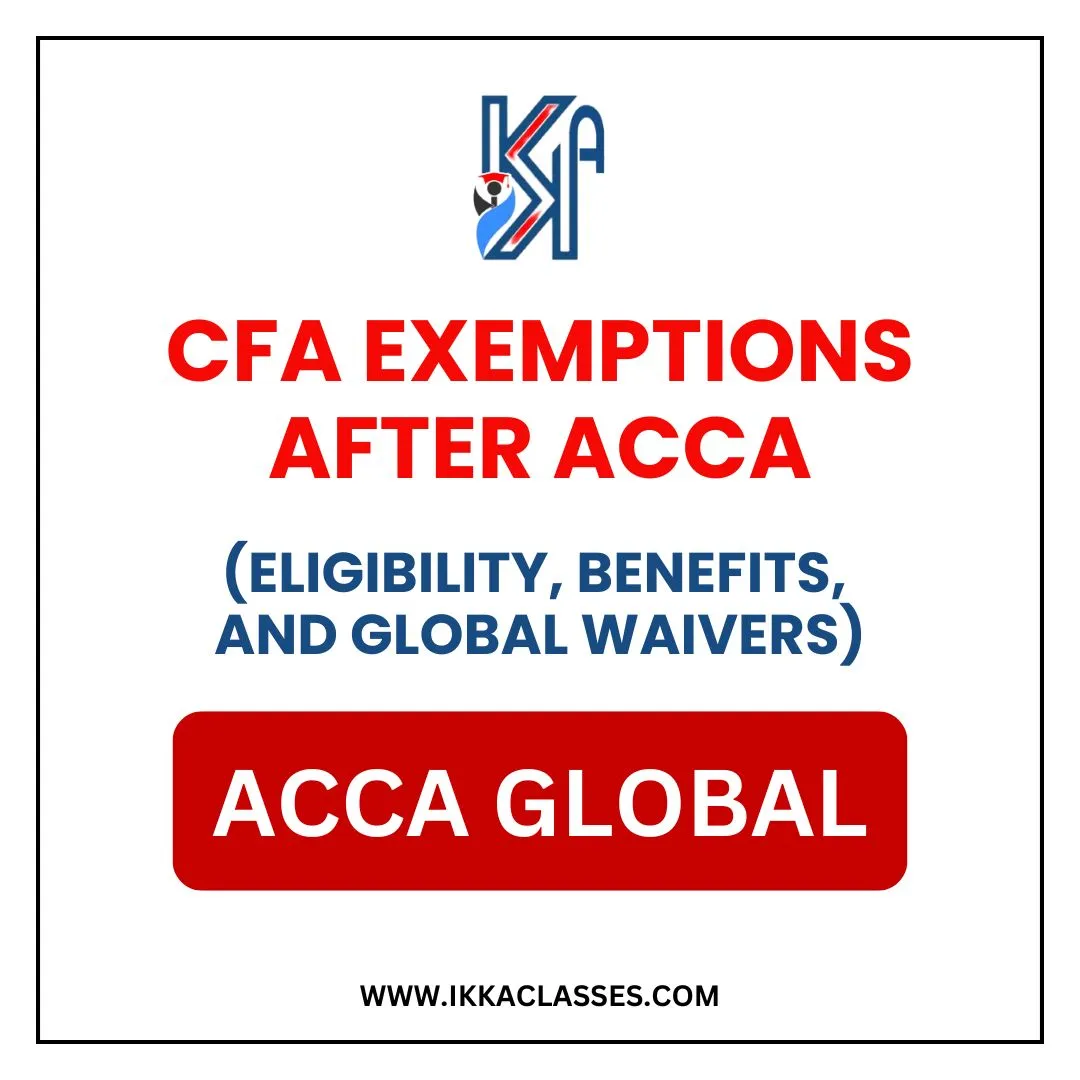Does CFA give exemptions for ACCA? If yes, then how many exemptions in CFA after ACCA?
Here’s the short answer: CFA exemptions after ACCA are zero. The Institute doesn’t offer exam exemptions for ACCA holders. You have to sit for all three CFA levels even if you’ve cleared all ACCA papers.
But here’s what confuses people: the exemption relationship works in reverse. CFA charterholders can get exemptions in ACCA, not the other way around.
This guide breaks down the actual exemption policies, why they exist this way, and whether pursuing CFA after ACCA still makes sense for your career
Table of Contents
ToggleCFA Exemptions After ACCA
Let’s clear this up: ACCA exemptions for CFA don’t exist.
CFA Institute has a strict policy. Everyone takes the same three exams regardless of their professional background. Whether you’re an ACCA member, a CA, or have a finance PhD, you start at Level 1.
Why no exemptions?
CFA Institute views their program as distinct from accounting qualifications. The ACCA course focuses on accounting, auditing, and financial reporting. CFA focuses on investment analysis, portfolio management, and wealth planning. The overlap isn’t significant enough in their view to justify exam waivers.
Other professional bodies offer exemptions to each other. ACCA gives exemptions to CA students. CIMA and ACCA have mutual recognition. But CFA operates differently.
What about subject familiarity?
Your ACCA background helps with CFA Level 1. Financial reporting, corporate finance, and ethics? You already studied this. You’ll review concepts faster than candidates without accounting knowledge.
But “familiarity” isn’t the same as “exemption.” You still sit for the exam. You still answer questions on these topics. You just need less study time to master them.
What Are ACCA Exemptions For CFA Charterholders And How To Apply?
Here’s where the exemption relationship actually works: CFA charterholders can skip one ACCA paper.
The exemption covers Financial Accounting (F3/FA). That’s it. One paper out of ACCA’s 13 exams.
Who qualifies?
CFA charterholders (all three levels passed plus work experience completed) or candidates who passed CFA Level III.
Why only F3?
CFA curriculum covers financial statement analysis in depth. Level 1 and Level 2 both test your ability to read balance sheets, income statements, and cash flow statements. ACCA’s F3 paper covers similar ground, so they recognize the overlap.
But CFA doesn’t teach audit, tax, or corporate reporting the way ACCA does. So exemptions stop at F3.
How Can CFA Charterholders Apply For ACCA Exemptions?
Getting your F3 exemption takes a few steps, but the process is straightforward.
Step 1: Get your waiver document from CFA Institute
Email recognition@cfainstitute.org and request the ACCA exemption letter. You need to prove you’re a charterholder or Level III pass.
Include your CFA membership ID and proof of exam results in your email.
Step 2: Submit to ACCA
Log into your ACCA account and upload the CFA Institute letter in the exemptions section. ACCA reviews and approves it within a few weeks.
Step 3: Documentation needed
CFA membership proof or exam transcripts showing Level III pass. The official letter from CFA Institute stating you’re eligible for F3 exemption. Your ACCA registration details.
Most people get approval in 2-3 weeks if the documentation is complete.
Benefits Of These ACCA Exemptions For CFA Holders
You save actual money
Each ACCA exam costs £132 for computer-based testing (as of 2025). Add study materials at £200-300 per paper. Mock exams, question banks, revision kits – another £100-150. You’re looking at £400-500 saved by skipping F3.
Not life-changing money, but it adds up when you’re already spending thousands on both qualifications.
Time matters more than money here
F3 takes 2-3 months of study time for most people. That’s 150-200 hours of reading, practicing, and revising.
As a CFA charterholder, you likely work in demanding roles. Finding 200 hours to study basic accounting concepts you already know from CFA? That’s frustrating.
Skipping F3 means you start ACCA with F4 (Corporate and Business Law) or F5 (Performance Management), topics that actually add new skills to your CFA knowledge base.
Career diversification speeds up
Say you’re working in asset management as a CFA charterholder. You want to move into corporate finance or CFO roles at portfolio companies. You need accounting credentials.
ACCA has 13 papers. That’s roughly 2-3 years of part-time study while working. Cut it to 12 papers and you shave 2-3 months off that timeline.
Those months matter when you’re competing for promotions or job opportunities. Getting ACCA done faster means you’re qualified for broader roles sooner.
This path works best for specific career moves
CFA charterholders moving from buy-side to corporate finance. Investment analysts transitioning to financial controller or FP&A director roles. Portfolio managers wanting CFO positions at companies they’ve invested in. Risk managers in financial institutions who need stronger accounting backgrounds for senior roles.
If you’re staying in pure investment management, ACCA doesn’t add much value. But if you’re diversifying into accounting-heavy finance roles, this exemption helps you get there faster.
What CFA Exam Exemptions Are Available Globally?
CFA Institute does partner with certain organizations for waivers, just not ACCA.
- University partnerships: Some universities have agreements where their finance graduates get recognition credits, but these don’t skip the CFA exams. They might waive work experience requirements or prerequisites.
- Regulatory partnerships: Financial regulators in some countries recognize CFA for licensing purposes. For example, passing CFA might reduce requirements for certain financial advisor licenses.
- What this means for ACCA holders: Understanding these partnerships helps you see why ACCA CFA exemptions don’t exist. CFA Institute keeps exam requirements consistent globally. They offer recognition and credit transfer in specific contexts, but professional accounting qualifications like ACCA don’t qualify.

Is Pursuing CFA After ACCA Worth It?
Yes, pursuing CFA after ACCA is actually beneficial career-wise. When you compare CFA vs ACCA, both of them cater to different areas of finance. So, you can broaden your horizons and gain diverse skill set.
Most finance professionals specialize in one area. Accountants don’t usually understand portfolio theory. Investment analysts don’t usually understand complex accounting standards. You’ll know both. Hence, it also improves your chances of moving ahead in the career ladder.
How Long Does It Take To Complete CFA After ACCA?
If you pursue CFA after ACCA, you will need around 2 to 4 years to complete it. This is because CFA exemptions for ACCA are nil, so you have to clear all three levels of CFA.
Level 1 takes 6 months to 1 year. Your ACCA background helps here. Financial reporting, corporate finance, and accounting concepts? You already know this stuff. However, Level 2 and Level 3 will take 1 to 1.5 years each.
Study hours matter more than the timeline. CFA Institute recommends 300 hours per level. But we see many of students clear it in 3 years. Others take it slow with work and take 4 years while working full-time. So, it’s subjective that way.
Benefits Of Pursuing CFA After ACCA
The following are the benefits of ACCA holders switching to CFA:
- You gain complementary skills
CFA adds investment and portfolio expertise to your accounting base. It’s the next logical step after ACCA for anyone aiming for roles in finance, banking, or investment.
- You become hire-ready for premium roles.
Investment banks, asset management firms, and multinational corporations need people who understand both accounting rules and investment strategy. Most candidates only know one side.
- Practical Synergy Between ACCA and CFA
Even though there are no direct ACCA exemptions for CFA charterholders, your ACCA knowledge helps you grasp CFA topics faster. It shortens your learning curve and strengthens your overall financial understanding.
- Deeper Understanding of Financial Statements
CFA gives you a stronger foundation in financial analysis than what’s covered in ACCA’s F3 paper. When you reach such subjects as Financial Reporting (F7) or Corporate Reporting (P2), you already think beyond accounting entries.
You understand how different accounting policies affect a company’s valuation, the ways in which earnings manipulation can be spotted, and how reporting links to investment decisions. Whereas most ACCA students focus on the preparation of statements, you also understand how investors interpret them, thus giving you a broader and more analytical view of finance.
Bottom line
If your career goals involve investment management, portfolio analysis, or moving into buy-side finance, CFA after ACCA makes sense despite no exemptions. If you’re staying in pure accounting, auditing, or tax roles, CFA might not add enough value to justify the time.
But for anyone aiming at CFO positions, corporate finance, or financial advisory, the combination gives you skills that most competitors don’t have.

Frequently Asked Questions About CFA Exemptions After ACCA
There are no direct exemptions in CFA after ACCA, as the CFA Institute doesn’t offer paper-wise exemptions. However, ACCA graduates often find CFA Level 1 easier since they already understand key finance and accounting concepts.
Yes, CFA after ACCA is worth it if you want to move from accounting to investment or portfolio management roles.

